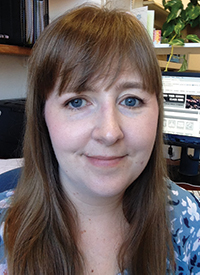Learn more about the relationship research carried out by Lauren Moy.
 Fourth-year Ph.D. student Lauren Moy sat down with Derner social psychologist Joy McClure, Ph.D., to discuss relationship research.
Fourth-year Ph.D. student Lauren Moy sat down with Derner social psychologist Joy McClure, Ph.D., to discuss relationship research.
The following interview was edited and condensed.
LM: Can you speak about how you ended up at Derner?
JM: I did my Ph.D. in Canada at McGill University. Then, I was lucky enough to set up a post-doc working with Niall Bolger at Columbia University and Pat Shrout at NYU, experts in intensive longitudinal designs and sta tistical methods that are important for studying interpersonal relationships. When the opportunity to work at Derner came up, I was really excited. It would let me stay in New York where I could continue to collaborate with researchers at Columbia and NYU.
When relationship researchers talk, we often say that learning about people’s relationships and social functioning is important because it can help improve lives. But we don’t often put our money where our mouth is. There’s a lot of basic research in social psychology and it’s only recently that we started doing interventionist or translational research. So the idea of getting to work with and participate in the training of clinical psychologists was exciting because it was an opportunity to take the research out of the lab and use it to help people.
LM: Tell us about your research interests.
JM: The theme underlying a lot of my research is the fundamental psychological need to belong. And, in particular, how we reconcile that motive, with a similarly fundamental desire to protect the self. So on the one hand, connecting with other people is something that we all want, but on the other hand, making those connections involves putting yourself out there, making yourself vulnerable. What if that person you asked on a date, says no? What if you come home from a really hard day and open up to your spouse and they don’t respond with the sort of care that you were expecting? So we can experience an ambivalence between wanting to connect with others and wanting to protect the self, either, chronically, associated with things like attachment anxiety, or contextually, associated with things like dating, new relationships, or social support in established relationships.
LM: How do you view the connection between social and clinical psychology?
JM: I joke to the undergraduates that all of psychology is social psychology. Obviously I’m a bit biased, but when you think about the basic definition of social psychology, it is the study of how our thoughts, feelings, and behaviors are affected by the presence—actual, imagined, or implied—of other people. Literally all of a person’s day-to-day life. We interact and carry people around in our heads; we react to the implied presence of others in the environment, even if they’re not there. Clinical psychology has a lot of really important points of intersection. You have to consider an individual in their social and interpersonal context. Clinical issues might arise out of interpersonal issues. When the person leaves your office, they’re going back out into their social context. The therapeutic interaction is a social interaction.
LM: How is it for you, a social psychologist, to teach in the clinical program?
JM: One of the fun things about teaching in the clinical program is that the students inspire me and I can learn from them. For example, learning more about therapeutic alliance struck me as being very consistent with some things that social psychologists see as being particularly useful in terms of social support. De-emphasis of the role relationship, i.e., reducing the “I’m the support provider and you’re the support recipient” has been shown to be effective in social support contexts. It’s also interesting to think about other potential intersections of social and clinical. I learned recently from a student that people with ADHD are known to have relationship issues. A lot of relationship maintenance, as it’s been studied in social psychology is pinned on executive function (e.g., the ability to regulate initial selfish or self-protective responses to partner misbehavior, or to devalue attractive alternatives). I think it would be interesting to try and replicate some of the classic studies on relation- ship maintenance with that in mind.
LM: I gather that you see a lot of potential for research in connecting social and clinical concepts…
JM: One area in which I see both fields starting to grow, which I think is going to be really exciting, is in the direction of diversity. We are becoming more cognizant of how what we know has been studied in relatively restricted populations. For example, a lot classic relationship research has been conducted with relatively high SES, well-educated, white, heterosexual couples. The processes that help or hurt their relationships may not generalize to other groups. And, indeed, some of the initial research in this area is starting to find important differences. If we’re trying to help people, we need to understand their social context, in all its diversity.
For further information, please contact:
Todd Wilson
Strategic Communications Director
p – 516.237.8634
e – twilson@adelphi.edu